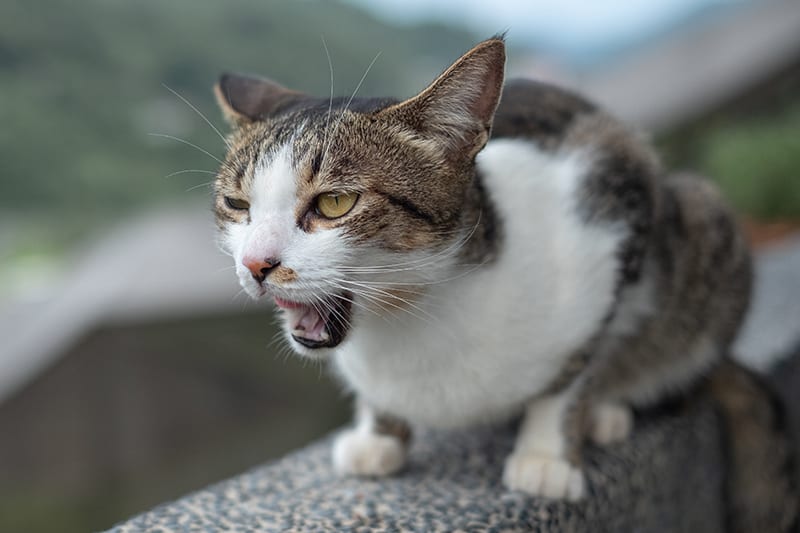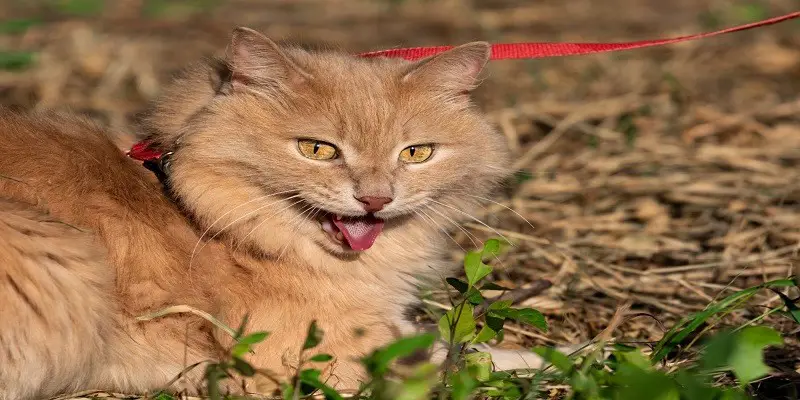Last Updated on January 14, 2025 by Pauline G. Carter
Cats pant to regulate their body temperature and to relieve stress. Panting is not a common behavior in cats and can signal an underlying health problem or discomfort.
Cats are known for their calm and aloof demeanor, but they can be prone to panting in certain situations. Panting in cats can be a sign of an underlying health issue, such as respiratory distress or heat stroke. In other cases, panting can be a natural response to stress or anxiety.
As a cat owner, it’s important to understand the reasons why cats pant and to recognize any changes in your cat’s behavior. In this article, we’ll explore the various causes of panting in cats, as well as the symptoms to watch for and when to seek veterinary care.

Credit: www.northeast-vet.com
Understanding Cat Panting As A Behavior
Cats are fascinating creatures with their unique and peculiar behaviors. One such behavior is panting, which can seem odd and alarming to cat owners. In this section, we’ll discuss what panting is, how cats commonly do it, the behavioral causes of panting in cats, and normal situations where panting may occur in cats.
What Is Panting And How Do Cats Commonly Do It?
Panting is the rapid and shallow breathing that you often see in cats after exercise or when they are feeling hot. Cats don’t sweat like humans do, so panting is their way of cooling down their body temperature. They breathe quickly to move the hot air out of their body and bring in cooler air.
Cats commonly pant by opening their mouths slightly and breathing rapidly through their mouths. You may also notice their tongues hanging out as they try to cool down.
Behavioral Causes Of Panting In Cats
While panting is typically a normal physiological response to heat and exercise, it can also be a sign of health issues or stress in cats.
- Fear or anxiety: Panting can be a sign of stress in cats. They may pant when they are afraid of something or feeling anxious.
- Pain: Cats may pant when they are in pain. If you notice panting accompanied by other signs of discomfort, such as hiding or low appetite, it could be a sign of an underlying medical condition.
- Overstimulation: Panting can also be a sign of overstimulation in cats, especially when they are playing too roughly or fighting with other cats.
Normal Situations Where Panting May Occur In Cats
In addition to exercise and heat, there are normal situations where panting may occur in cats.
- After grooming: Some cats may pant after grooming, particularly if they have been groomed for a long time or with a grooming tool that may have pulled their fur.
- Being in a carrier: Cats may pant when they’re in a carrier due to the lack of airflow or temperature changes.
- Traveling: Panting can also occur when cats are traveling, particularly if they’re not used to the motion of a car or plane.
While panting is typically a normal response to heat and exercise in cats, it can also be a sign of health issues and stress. Keep an eye out for abnormal panting behaviors in your cats, and don’t hesitate to consult with your vet if you have any concerns.
Health-Related Reasons For Cat Panting
If you notice your cat panting, you might assume it’s normal behavior, as seen in dogs. However, panting in cats is unusual and may indicate health problems. We’ll discuss the health-related reasons why cats pant and what you should do if you find your cat panting excessively.
So let’s dive in and learn more.
Common Medical Conditions That Can Cause Panting In Cats
Some of the underlying medical conditions that cause panting in cats include:
- Heart disease: Heart failure or other heart-related diseases can cause difficulty breathing and panting in cats.
- Respiratory disease: Asthma, pneumonia, and other respiratory illnesses can cause panting or trouble breathing.
- Anemia: If your cat has low oxygen-carrying capacity in their blood, it can cause panting when they exert themselves.
- Infections: Certain infections can cause upper respiratory issues and make it hard for your cat to breathe.
What To Do If Your Cat Is Panting Excessively
If you see your cat panting, it’s essential to take action.
- Check their surroundings: Ensure your cat is in a safe environment with sufficient air circulation and airflow.
- Encourage rest: If your cat is panting due to overexertion, ensure they get plenty of rest and cool down.
- Visit a vet: If you notice your cat panting excessively, it’s best to consult with a vet. They will examine your cat and determine the underlying cause of the issue. They may also prescribe medication, oxygen therapy, or other treatments.
Panting in cats is not typical behavior and may warrant medical attention. Keep an eye on your cat’s breathing patterns and seek immediate treatment if you notice excessive panting. By being proactive about your cat’s health, you can keep them happy, healthy, and comfortable.
Preventing Cat Panting And Promoting Their Health
Cats are wonderful animals, and they bring joy and personality to our homes. However, seeing our feline friends panting can be a cause for concern, and even panic in some cat owners. Repeated panting can be an indication of an underlying health issue, or it could simply mean that your furry friend is overheated.
In this section of the blog post, we will discuss how to prevent cat panting and promote their overall health.
Proper Cat Care And Adjustments That Can Lead To Decreased Panting
To keep your cat healthy and safe, here are some tips to consider:
- Make sure your cat drinks enough water to stay hydrated.
- Provide your cat with fresh, high-quality food and keep the feeding areas clean.
- Make sure that your cat’s litter box is accessible and clean.
- Brush your cat’s fur regularly, especially if they have a long coat. This will help them regulate their body temperature better and avoid overheating.
- Ensure your cat stays up to date on their vaccinations and deworming.
Environmental Adjustments To Decrease Anxiety And Promote Relaxation
Cats are sensitive animals, and environmental changes can lead to them feeling anxious or stressed.
- Provide your cat with hiding spots such as a cat condo or a cardboard box with a hole for them to peek through.
- Give your cat toys to play with, especially interactive ones.
- Make sure there is adequate space for your cat to move around and explore.
- Provide your cat with a scratching post to satisfy their natural urge to scratch and stretch their muscles.
- Use feliway or other calming sprays or diffusers to promote relaxation.
Best Practices For Identifying Potential Health Concerns Early On
It is always best to spot potential health concerns early on to ensure timely treatment.
- Monitor your cat’s behavior closely. Changes in appetite or activity level could indicate health problems.
- Regularly check your cat’s body for lumps, bumps, or wounds.
- Keep a record of your cat’s weight and any other health-related observations.
- Make sure your cat has an annual checkup with a veterinarian.
By following these tips, you can keep your cat healthy, happy, and comfortable, ultimately preventing panting episodes. Remember to provide your feline companion with lots of love and attention, and don’t hesitate to bring them to the veterinarian if you notice any concerning symptoms.
Frequently Asked Questions Of Why Do Cats Pant?
Why Do Cats Pant Like Dogs?
Cats pant to maintain body temperature and cool down in hot weather.
Is Cat Panting Ever Normal?
Yes, cats may pant due to stress or excitement, but excessive panting may indicate a health problem.
What Health Issues Can Cause Cat Panting?
Respiratory infections, heart disease, and obesity can result in excessive panting in cats.
How Can You Prevent Cat Panting?
Ensure that your cat has access to a cool and comfortable environment and keep them hydrated.
When Should You Seek Veterinary Help?
If your cat is panting excessively, appears distressed, or has other concerning symptoms, see a vet immediately for evaluation.
Conclusion
To summarize, panting in cats is not a common behavior and can indicate underlying health issues. Dehydration, stress, heat exhaustion, and respiratory problems can cause cats to pant, and it is important to identify the root cause to provide appropriate treatment.
While it is natural for cats to pant after physical exercise or high-intensity play, constant panting should raise a red flag. It is recommended to take your furry friend to the vet for a checkup if you notice any changes in their breathing patterns, especially if they are accompanied by other symptoms like lethargy or appetite loss.
Remember, as a pet owner, your role is to provide a safe and healthy environment for your feline companion. Understanding why cats pant is the first step towards ensuring the wellbeing of your furball and promoting a happy and active lifestyle.

